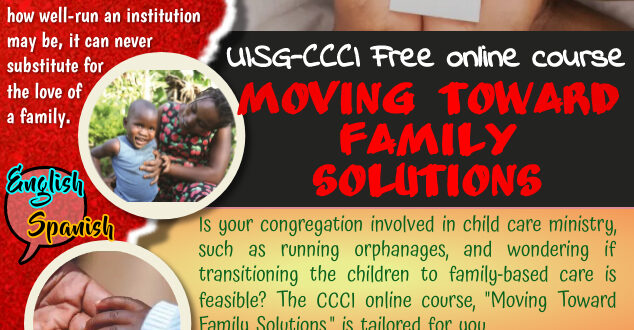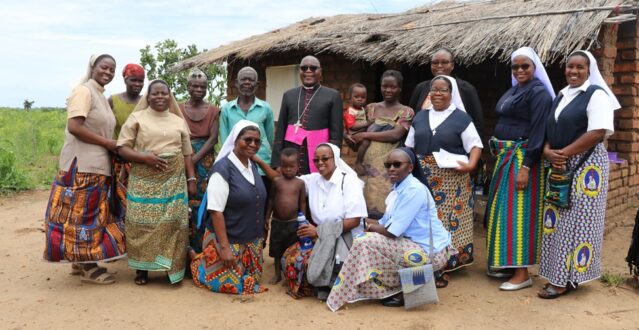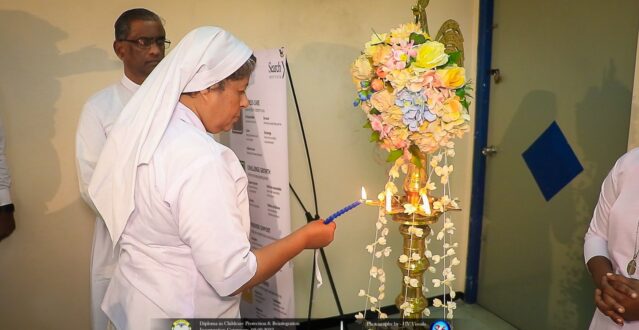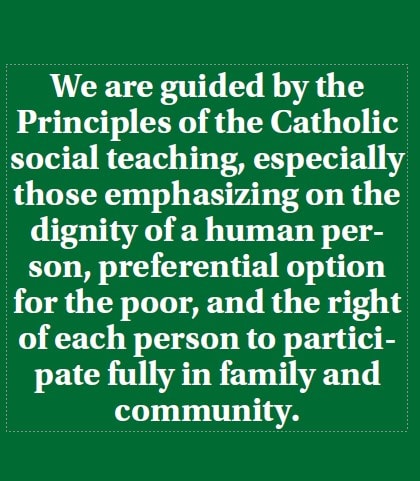
“AOSK-CCCK understands the importance of child space to participate in any decision concerning them. With this at heart, we have activities that targets children to ensure that they are also sensitized on their rights more specially to grow in the family.”
AOSK-CCCK was founded in May 2018 after the senior global program officers of GHR Foundation, Mr. Dan Lauer and Dr. Kathleen Mahoney, paid a visit to the AOSK Secretariat and had a lengthy conversation on care reforms with sisters in their mission of care for children and vulnerable adults. GHR Foundation and AOSK in partnership have brought about drastic change by helping sisters respond better to their charism of care: Catholic Sisters are the majority of religious members of the Catholic Church who for decades have been in the mission of caring for children and vulnerable adults.
With this partnership, AOSK through its Catholic Care for Children in Kenya (CCCK) initiative consolidates efforts of all its member congregations and of clergy and religious men who have a charism of care for vulnerable children to champion a continuum of care that holds dear to holistic family- and community- based care for children.
We have also, as CCCK, created a synergy to scale up care reforms by strategically creating a structure to offer quality, affordable and sustainable programs to our member congregations and to our religious men especially those with Charitable Care Institutions for children.
CCCK is ensuring that all member congregations of AOSK have a child protection policy in place for the purpose of safeguarding minors against violation of their rights. With this, CCCK supported 41 congregations to develop their child protection policy guidelines to ensure that all sisters adhere to the measures of safeguarding in all their apostolates. CCCK also organized trainings to ensure that the sisters understand how to better safeguard children.
CCCK has brought together the administrators of Catholic Charitable Care Institutions. They come together more often both online and onsite to learn how to transit from institutional care to family- and community-based care. They also share challenges, state situations of Catholic care institutions, and the way forward towards care reforms as a movement.
These meetings serve as platforms to enable sharing of fears, challenges, and achievements. They also serve as a forum to mentor one another in the promotion and realization of family- and community- based care. Members also discovering other opportunities that exist beyond single institutions.
AOSK-CCCK carried out a baseline survey and one of the findings was that most of the sisters serving as administrators in charitable care institutions founded by congregations or the diocese had no professional skills in care and protection of children. We therefore embarked on training some sisters in social work at the Catholic University of Eastern Africa, some in integrative psychospiritual counselling, some in disability care, and some in resource mobilization and donor transitioning, among others. The communities have not been left behind: they are taught by our TOTs on positive parenting and re-embracing of family- and community-based care, which is integral to the culture of Africans. This has helped sisters and community members to have a wider perspective about care reforms, acquiring skills and knowledge that enhances their competences, and having confidence of doing what is acceptable with the wider society of care and protection of the minors.
It also has helped them to understand their role as agents of evangelization from a faith perspective and their role in the apostolate of strengthening families, as well as the need to incorporate science and academia to help facilitate and enable promotion of child development in a family environment, which is a universal right for all children.
Sensitization of sisters’ communities has continued to take shape to ensure that no sister is left out in care reforms. This is because all sisters, in one way or another, serve or come in contact with children. For example, a sister serving as catechist in any given parish, a sister nurse working in a hospital, a sister teaching in a school or dormitory, a sister working as an animator of pontifical missionary children in the parish or diocese.
All these sisters, whether or without their congregations have Charitable Children Institutions, have to be part and parcel of care reform because they are the ones who refer these children for admission in care institutions. In addition they visit and feed these children. With that in mind, CCCK ensured that all were sensitized on child safeguarding, positive parenting, and legal frameworks when it comes to child services. Sisters also serve in the communities and have a responsibility to help the communities unlearn the mindset of child institutionalization and instead embrace family- and community-based care. So far, AOSK-CCCK has reached 3, 000 plus people from the communities including children.
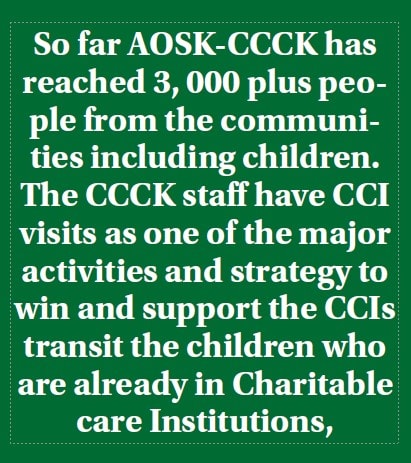
The CCI visits are some of the major activities and strategies of the CCCK staff to support the CCIs’ transit for the children who are already in Charitable Care Institutions and the donors or benefactors who support institutionalization. The visits help in creating a rapport with the institutions. They also help CCCK understand where they are in terms of care reforms, to supervise if they are operating within minimum standards of care, if they are registered by the government (have a certificate of registration/or the certificate is renewed), and more importantly, if they are reintegrating children in good time without prolonging their stay in the institutions. The visits also serve as an opportunity to share and learn with those working in the given institutions and to encourage them to embrace fully family- and community-based care.
For the purposes of documentation and promoting best practices in the Charitable Children Institutions and assessing the progress of reintegration of children from CCIs to families or alternative care, the CCCK developed an online database for all institutions under Catholic Care. Through the database, they can have proper documentation of children’s information using government-approved case management tools that have been incorporated in the system. The system facilitates proper management of children’s cases from admission to exit. It also helps the social workers and administrators to prepare individual child care plans to facilitate sustainable reintegration of children, monitor the progress of reintegration, plan for the institutions’ resources, and mobilise for more resources.
AOSK-CCCK understands the importance of children participating in any decision concerning them. With this at heart, there are activities that target children to ensure that they are sensitized on their rights but even more to help them grow in a family unit. Some of these activities target children from care institutions as well as children from the communities because some of them are at risk of being separated from their parents or families. In addition, these activities are held to enable children to learn and know that the best place to grow up is in the families.
Care reforms should not be something to be feared. As a practitioner with CCCK, I have come to concur with the researchers who say that most of the children in our communities are admitted in Charitable Care Institutions because of poverty. From my experience, I believe that this is true with few of them being admitted due to orphanhood, and another fraction because of abuse and violation of their rights.
Also it is evident that most children are left in CCIs for a longer period of time than necessary because most of the CCI administrators, board of trustees, and management think that for a child to be helped, they have to finish primary or secondary education while still in the CCI.
With a lot of sensitization and trainings carried out with CCCK, we have seen sisters, the clergy and community members change their minds and hearts when it comes to care reforms. Religious men and women from the conversations that we have had with them now feel strongly about this issue and, as agents of evangelization, have been reminded of their responsibilities and roles in strengthening families and protecting minors as it is a pastoral issue of concern in today’s world.
It has been heartwarming when I see religious men and women who have founded or are running Charitable Care Institutions because of their charisms tell me that they strongly feel the need to help children rejoin their families, and to repurpose their institutions into other services that will still focus on strengthening the families and safeguarding the children.
I have had an opportunity to traverse more than 100 Catholic CCIs and the changes are evident, starting from a change of attitude and desire to reach to the communities and help in unlearning the culture of institutional care, to that of family- and community-based care. In reality, it’s a journey or process that needs determination, patience, courage and prayer, because a lot still has to be done to ensure that a child is not harmed in the process and to ensure that the child’s best interests are taken into consideration.
It is very possible to have children grow up in families or a family-like environment because “sisters began, they are doing it, and they will continue to do it.” It is a journey that needs all of us. I call upon all well-wishers and people of good will to support religious men and women to achieve this good work that they are doing. The support is not only in terms of financial resources, but even to just tell a friend, your family members, and your community that care reforms for children are for all of us and their acceptance and prayer also counts a thousand times. In humility, I pray and request those who will read this story to help us support those transiting children from care institutions back to families, and to help strengthen families for all children to have an opportunity to grow up in safe, loving and nurturing families anywhere in the world. It is doable and we can do it together.






